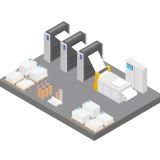In this article:
What is a Pulp and Paper Engineering Degree?
A pulp and paper engineering degree focuses on the science and technology of turning raw materials like wood into paper and related products. This degree teaches students about the processes used to make paper, including pulping, bleaching, and recycling, as well as the equipment and systems involved. It emphasizes creating products efficiently while minimizing waste and environmental impact.
Students in this program learn the basics of chemical engineering, material science, and environmental sustainability. They also explore how to improve the quality and performance of paper products, optimize production methods, and find innovative ways to reduce energy use and emissions in manufacturing.
Program Options
When pursuing a pulp and paper engineering degree, students have several program options to choose from:
- Associate Degree in Pulp and Paper Technology: This program introduces students to the fundamentals of paper manufacturing processes and equipment. It prepares them for entry-level technical positions in paper mills or related industries.
- Bachelor’s Degree in Pulp and Paper Engineering: This undergraduate program provides a comprehensive education in the science and technology behind pulp and paper production. Students learn about material science, chemical processes, and environmental considerations, preparing them for roles in production, quality control, or research and development.
- Master’s Degree in Pulp and Paper Engineering: This advanced degree focuses on specialized areas like sustainable production methods, advanced materials, and process optimization. It is ideal for students aiming for leadership roles or research positions in the industry.
- Ph.D. in Pulp and Paper Engineering: A Ph.D. program emphasizes cutting-edge research in areas such as innovative product development, energy-efficient manufacturing, or environmental impact reduction. Graduates often work in academia, research institutions, or as industry consultants.
Skills You’ll Learn
Students pursuing a pulp and paper engineering degree acquire a range of specialized skills essential for careers in the pulp and paper industry:
- Pulping Processes: Understanding the chemical and mechanical methods used to extract cellulose fibers from wood and other raw materials, including techniques like kraft pulping, sulfite pulping, and mechanical pulping.
- Papermaking Technology: Learning the processes involved in forming, pressing, and drying cellulose fibers to create paper sheets. This includes knowledge of paper machine operations and the principles of paper formation and structure.
- Fiber Technology: Gaining insights into the properties and behavior of different types of fibers, including wood fibers, recycled fibers, and alternative non-wood fibers, and how these impact paper quality and performance.
- Chemical Engineering Principles: Applying chemical engineering concepts to the design and optimization of processes involved in pulp and paper production, such as chemical reactions, heat transfer, and mass transfer.
- Mechanical Engineering Skills: Utilizing mechanical engineering techniques to maintain and improve the machinery and equipment used in paper mills, including pumps, conveyors, and paper machines.
- Environmental Management: Developing strategies for minimizing the environmental impact of paper production, including waste management, energy efficiency, water conservation, and pollution control.
- Process Control and Optimization: Learning methods for monitoring and optimizing production processes to improve efficiency, product quality, and resource utilization, often using advanced control systems and data analysis.
- Quality Control: Implementing quality assurance practices to ensure that paper products meet industry standards and customer specifications. This includes testing and analyzing paper properties such as strength, brightness, and smoothness.
- Sustainable Practices: Understanding and applying principles of sustainability in the pulp and paper industry, including the use of renewable resources, recycling, and sustainable forestry practices.
- Research and Development: Engaging in research to develop new products, improve existing processes, and innovate new technologies in the pulp and paper sector. This involves experimental design, data analysis, and collaboration with other scientists and engineers.
- Project Management: Acquiring skills in planning, executing, and managing projects within the pulp and paper industry, including budgeting, scheduling, and team coordination.
What Can You Do with a Pulp and Paper Engineering Degree?
With a pulp and paper engineering degree, graduates can pursue various career paths in the pulp and paper industry and related sectors. Here are some common roles:
- Pulp and Paper Engineer: Specializing in the technical aspects of paper production, pulp and paper engineers design, implement, and optimize processes for converting raw materials into paper products. They work on improving efficiency, quality, and sustainability in paper mills.
- Project Manager: Leading projects related to the installation, upgrade, or maintenance of equipment and systems in paper mills. Project managers are responsible for planning, budgeting, scheduling, and ensuring that projects are completed on time and within budget.
- Consultant: Providing expertise and advice to paper mills, government agencies, or non-profit organizations on various aspects of pulp and paper production. Consultants may specialize in areas such as process optimization, environmental compliance, or product development.
- Operations Manager: Managing overall operations in a paper production facility, including production, maintenance, and logistics. Operations managers ensure that the facility operates efficiently and meets its production goals.
- Environmental Engineer: Focusing on reducing the environmental impact of paper production. Environmental engineers develop and implement strategies for waste management, pollution control, water conservation, and energy efficiency to promote sustainable practices in the industry.
- Process Engineer: Optimizing and improving the production processes in paper mills. Process engineers work on enhancing efficiency, reducing costs, and ensuring the quality of paper products through the application of chemical and mechanical engineering principles.
- Quality Control Engineer: Ensuring that paper products meet industry standards and customer specifications. Quality control engineers conduct tests, analyze results, and implement quality assurance practices to maintain high product standards.
- Production Manager: Overseeing daily operations in paper mills, including managing staff, coordinating production schedules, and ensuring efficient use of resources. Production managers play a crucial role in maintaining smooth operations and meeting production targets.

